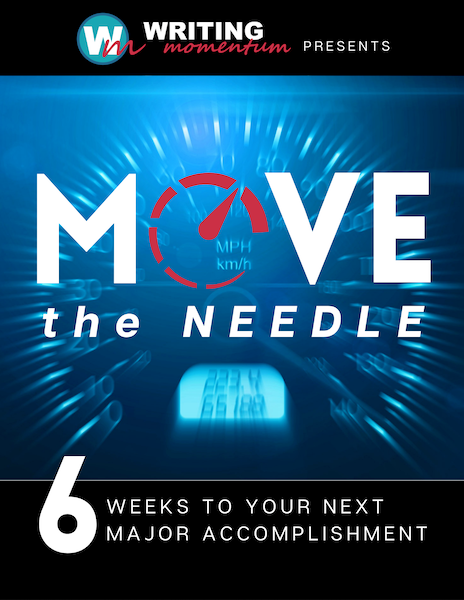Episode 62
AVOID This Writing TRAP Like the Plague
In this episode of the Writing Momentum podcast, Chris and Gena talk about three traps writers often fall into when writing--and how to avoid them like the plague. Make your good writing GREAT when you put these tips into practice.
Links:
- Liz Wilcox's Email Marketing Membership: https://writing.fyi/liz
- Get your FREE Move the Needle goal-setting for authors ebook at https://www.writingmomentum.com
- Write with us! Join Chris, Gena, and Rene each Wednesday at noon Central and let's get our writing DONE! https://www.writingmoments.com
Transcript
Hi, and welcome to the Writing Momentum Podcast.
Gena:I'm Gena Maselli, and this is my husband, Christopher Maselli.
Christopher:Hey.
Gena:And we are here to talk about avoid this writing trap like the plague.
Gena:And we are talking today, Chris, about this writing trap that sneaks in,
Gena:in just about any kind of writing.
Christopher:Yeah.
Christopher:This is a writing trap that you will see often, so often that you
Christopher:might say, wow, that seems like a cliche, and that's because it is.
Christopher:That's exactly what we're gonna talk about here.
Christopher:This writing trap is cliches, but cliches maybe aren't
Christopher:entirely what you think they are.
Christopher:How would you define a cliche Gena?
Gena:I would define a cliche as anything that is written.
Gena:That and we're talking about writing here, so that's, I'm gonna limit it to that.
Gena:But anything that is lit written that has been used so much.
Gena:That it has lost its punch and have even caused people to roll their eyes.
Christopher:That's a good way to look at it.
Christopher:Something that makes you roll your eyes, cuz you've seen it so many times.
Christopher:So for instance, this makes me think of when I was a judge with Writer's
Christopher:Digest for a while, and one of the things I was a judge for children's
Christopher:picture books and I received literally hundreds of children's picture books
Christopher:that people had sent in for the contest.
Christopher:And then I had to judge them, right, and then say, here's the ones who win.
Christopher:Here's the ones who don't.
Christopher:And what I was surprised with was how many common things that
Christopher:I saw among those manuscripts.
Christopher:And one of the biggest ones was the cliche.
Christopher:The cliche of Once Upon A Time.
Christopher:We grew up, many of us with books that started with the words Once Upon a Time.
Christopher:And so when we write our children's material, we want to start like that,
Christopher:but those words have become a cliche.
Christopher:And by starting your book with Once Upon a Time, unless it's
Christopher:like a fractured fairytale, right?
Christopher:That's trying to make fun of that genre, it doesn't really work anymore
Christopher:because it's been done so much.
Christopher:So if you're writing a children's book, you don't want to start with words like
Christopher:that because they've become a cliche.
Christopher:And that could be said for, I think for a lot of words that you put
Christopher:individually in a book, if you're having characters talk, and in their
Christopher:dialogue they're saying things that are cliches, it's okay once in a while,
Christopher:but if you do it too often, it becomes.
Christopher:Cliche.
Gena:It becomes cliche and it loses its punch.
Gena:Chris is talking about children's books, but this is in all writing.
Gena:This can be in non-fiction as well.
Gena:One of the ones that has become very popular right now that every time I
Gena:hear it, I just cringe on the inside, is when a speaker or a writer tells
Gena:me they're going to unpack something.
Gena:I've gotten to the place where I'm like, I loved that when it first came out, but
Gena:that's about 10 years ago and we need to come up with a new way of saying it.
Gena:Another one would be for the non-fiction writer, the advice that
Gena:we've been given, pull yourself up with, from your bootstraps.
Gena:Or you've gotten out on the wrong side of the bed in the morning.
Gena:This is our job as writers, to come up with a new way of saying
Gena:what maybe has become a cliche.
Christopher:Yeah, to be more creative.
Christopher:Say it's been said like this a hundred times before, how can I say, the same
Christopher:thing, but in a new and fresh way.
Christopher:And sometimes you'll see, the books that strike you most, the lines that
Christopher:strike you most aren't the ones that are necessarily completely original,
Christopher:but the ones who say something that you know and agree with deep down inside,
Christopher:but they say it in a way that you never quite thought of it that way before.
Christopher:You've never heard a phrase that way before and it sticks with you.
Gena:That's the thing that really grabs you.
Gena:And I think it's that unexpected, because sometimes if you're talking
Gena:about something or you're writing a scene, or you're writing a chapter, or
Gena:you're writing an article or a blog post.
Gena:The thing that will really resonate with people is the unexpected.
Gena:It's that it's taking something where they think they know where you're going,
Gena:and then you flip it on its head, or you twist it in such a way, in some
Gena:fresh way that makes people go, oh, I never thought of it like that before.
Christopher:And so this happens a lot with individual words, but
Christopher:it can also happen in scenes.
Christopher:There are scenes that we put in our books that are cliche, and
Christopher:these also show up in movies.
Christopher:In movie scenes.
Christopher:So what's an example of a scene that you would say, man, that is totally a cliche.
Gena:And I will put a little bit of a disclaimer on this to say that some of
Gena:the most popular movies or companies that produce movies live on cliches,
Gena:and they have made a whole kind of genre on cliches, and that is okay.
Gena:That is, that's their model, that's their genre.
Gena:That's their, that's what they have created and that's what they're doing.
Gena:But I automatically think of the meet cute in the movie where the girl has
Gena:got something super heavy in her hands and she turns, and she of course,
Gena:bumps into the billionaire because she's the overworked woman and she
Gena:hits the billionaire and loses all her packages or whatever, and he sits
Gena:there and helps her gather 'em all up.
Gena:And then they have this moment where they lock eyes and they have this connection.
Gena:I admit I watch some of those movies myself and they're fun.
Gena:But that is a cliche.
Christopher:It's a cliche and I think the reason it's a cliche is
Christopher:because everyone does it the same way.
Christopher:It's always the woman has the files or the papers.
Christopher:She always runs into the man.
Christopher:The papers hit the floor, they bend down, and then their eyes catch
Christopher:each other on the way up, right?
Christopher:It's done the same way every time, and I've seen it done in books that way too.
Christopher:So what you want to do is you may need that meet cute moment, right?
Christopher:You may need that moment where the characters first fumble into each other,
Christopher:but that doesn't mean you have to do it the way that everyone has done it.
Christopher:You can find a creative way, think, how can I make my characters meet without the
Christopher:carrying the papers fall scene, right?
Christopher:How can I do something that's the same emotion, the same result, but
Christopher:comes at it in a fresh new light?
Christopher:And that I think, is our challenge as writers, is to be creative like that,
Christopher:to say I'm gonna turn this cliche on its head and make it to where the reader
Christopher:doesn't even really realize that's what just happened, even though it did or
Christopher:won't realize until after they've passed it that, oh, that's like where they,
Christopher:you know that's the meet cute, right?
Christopher:If you're analyzing it, but you may not realize it right away.
Gena:Absolutely, and that's the thing I think when you're talking
Gena:about the just individual words or lines, that kind of thing that's
Gena:the thing that you can come back to.
Gena:That's the thing that when you are editing, maybe you write it that with the
Gena:cliche the first time you go through it.
Gena:But when you come back, and this is fiction, non-fiction,
Gena:this is article, blog, book.
Gena:It doesn't matter.
Gena:But you come back to it and you say, okay, that's a cliche, how can
Gena:I say that in a new original way.
Gena:So that's gonna happen at the editing phase.
Christopher:Instead of once upon a time, you sit and look at
Christopher:it and you go how about a long time ago in a galaxy far away?
Christopher:And suddenly you're saying that's the same thing, right?
Christopher:It's basically saying the same thing.
Christopher:But when George Lucas wrote that for Star Wars, it took
Christopher:on a whole new, fresh feeling.
Gena:Yes, definitely.
Gena:Now when you're writing long form story this is the kind of thing that's gonna
Gena:happen more on the front end, right?
Gena:When you're really thinking it through and you're really
Gena:planning and you're developing.
Christopher:I think so.
Christopher:I would like to get that scene created correctly in the plotting phase.
Christopher:But I'm a plotter, right?
Christopher:So I like to make sure that, okay, I'm gonna plot that out, make sure
Christopher:I've got that meet cute happening in a way that isn't traditional.
Christopher:But that said, don't let that stop you from moving on.
Christopher:It's totally fine if you wanna do the way it's always been done, and
Christopher:then go back in the editing phase and say, okay, this scene needs
Christopher:to be a little fresher, something more exciting needs to happen here.
Christopher:And then you change it up and build it up.
Christopher:And sometimes then you can tie that in to a scene later in the book
Christopher:that will really become meaningful.
Christopher:And then the whole thing takes on a whole new light.
Gena:We should definitely do a podcast about tiebacks.
Gena:Because we use them, quite a bit in, you can use them in fiction,
Gena:you can use 'em in non-fiction, you can use them in an article.
Gena:You can use them in a blog.
Gena:It doesn't matter.
Christopher:That's a teaser.
Christopher:We'll do that one for sure.
Gena:We'll do that one for sure.
Gena:Tiebacks, weaving those things in.
Gena:So yeah, we'll look at that.
Christopher:So cliches can be words, like once upon a time .Cliches can be scenes
Christopher:like the meet cute, but cliches can also be the entire structure of your story,
Christopher:which can be a little scary, honestly, to think that, okay, am I writing
Christopher:something that's already been done?
Christopher:And the truth is, almost everything has been done, but you can
Christopher:still write it in a fresh way.
Christopher:And so one of the things that we were talking about earlier was who uses formula
Christopher:so well, and has almost turned them into a cliche, and that's Hallmark, right?
Christopher:They do that with Hallmark movies.
Christopher:They have got a formula that they use and you expect certain things
Christopher:to happen in a Hallmark movie, but it works for them because that's
Christopher:their formula and that's Hallmark.
Christopher:But there are other competitors now who've come on the scene who
Christopher:like, Amazon Prime or other services that decide, oh, we want to create
Christopher:something that's like a Hallmark movie.
Christopher:So they take a similar formula and they try to do the same thing, but because
Christopher:it's not under the Hallmark brand, it doesn't come across as formulaic.
Christopher:It comes across as cliche, it's like they're copying Hallmark.
Christopher:And so what they need to do is they need to say, how can we change the structure
Christopher:of this to give it a twist, give it something unique that's different, that
Christopher:separates us from that industry standard.
Gena:They do, and they start bringing in different types of meet cutes.
Gena:If you want to have a kind of a fun exercise for yourself, go ahead and watch
Gena:a Hallmark movie and then watch an Amazon movie and look for the differences.
Gena:Look for the ways that they've tried to freshen it up, or ways they've
Gena:tried to make it more their own.
Christopher:I really encourage you with those, not only to watch them,
Christopher:but, and watch 'em back to back.
Christopher:But sit down with a piece of paper and outline them as they happen,
Christopher:what happens in what order in this?
Christopher:And you'll see that there is a definite correlation between, if you pick two
Christopher:romantic movies, there's gonna be a definite correlation between those.
Christopher:If you pick two adventure movies, un that have happened over time,
Christopher:you're gonna find correlations.
Christopher:But then you can also see where they vary and where they diverge from the norm, and
Christopher:that's where it just becomes fascinating.
Gena:That's great.
Gena:So today we are talking about helping you identify and
Gena:avoid cliches in your writing.
Gena:Whether that is in fiction or non-fiction, just in any form.
Gena:Look for those things that have been.
Gena:Look for those things that have been overdone.
Gena:Look for those things that are no longer fresh and come up with a more creative
Gena:way of saying that or completing that.
Christopher:Absolutely.
Christopher:We hope you enjoyed this episode.
Christopher:If you did, please rate, review, subscribe, and share
Christopher:with someone that you know.
Christopher:It really helps if you subscribe to it because then you won't miss the
Christopher:next one when we talk about what did we just say we were gonna talk about?
Gena:We were gonna talk about, what are we gonna talk about?
Christopher:The tiebacks
Gena:The tiebacks.
Gena:Talk about tiebacks.
Christopher:I need to write it down.
Christopher:We're gonna do tiebacks in one of our upcoming episodes here.
Christopher:And if you don't wanna miss that, and I strongly recommend you
Christopher:don't, because it's such a powerful writing technique, subscribe.
Christopher:When you subscribe on your podcast app or on YouTube, you'll be sure you'll
Christopher:get notified when the next episode comes out and you won't miss a thing.
Christopher:So we thank you so much for joining us.
Christopher:We appreciate it.
Christopher:We love you guys.
Christopher:You're awesome.
Christopher:And remember that what Gena?
Gena:Together we have writing Momentum.





